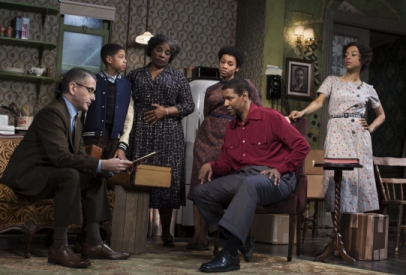Review: A Raisin in the Sun

David Cromer, Bryce Clyde Jenkins, LaYTanya Richardson Jackson,
Anika Noni Rose, Denzel Washington, and Sophie Okonedo
in A Raisin in the Sun
(©Brigitte Lacombe)
If director Kenny Leon had a less than ideal leading man in Sean Combs for his 2004 Broadway production of A Raisin in the Sun, he has no such problem this time. Denzel Washington--although arguably twenty years too old for the role--delivers a superlative performance as Walter Lee Younger in this new, beautifully staged revival featuring equally stirring performances from the entire ensemble. While yet another Broadway revival a mere decade later might have seemed premature, Lorraine Hansberry’s 1959 classic well deserves revisiting.
The play, set in Chicago’s South Side “sometime between World War II and 1960,” concerns the travails of the three-generation Younger family living together in a cramped tenement apartment. They include grandmother Lena (LaYTanya Richardson Jackson), whose beloved husband has recently died; her chauffeur son Walter Lee (Washington) and his wife Ruth (Sophie Okonedo), who works as a domestic; the couple’s young son Travis (Bryce Clyde Jenkins); and Walter’s younger sister Beneatha (Anika Noni Rose) who plans on attending medical school.
The play's central conflict revolves around the $10,000 that the family is about to receive from their late patriarch’s life-insurance policy. Lena is intent on using the money to buy a house for the family and for her daughter’s education, while Walter is desperate to fulfill his dreams of owning a business by purchasing a liquor store with his (unseen) friend Willy.
Walter and Ruth’s marriage is clearly deeply strained because of his frustration with his lot in life. Beneatha, meanwhile, is happily juggling two suitors: George (Jason Dirden), who comes from a wealthy family; and the Nigerian-born Joseph (Sean Patrick Thomas), who disdains her desire for assimilation and regales her with paeans to his African homeland.
When the money finally arrives, Lena, without her family’s prior knowledge, makes a down payment on a modest house in the city’s all-white neighborhood of Clybourne Park. This naturally doesn’t sit well with Walter, but she pacifies him by giving him the rest of the money, with instructions to put half of it aside for Lena’s education. But Walter’s trust in his would-be business partner is sadly misplaced, with tragic results.
The racism permeating the era is personified in the form of Karl Lindner (famed theater director and occasional actor David Cromer), the head of the Clybourne Park homeowners’ association whose friendly demeanor during an unannounced visit masks his true intentions, which is to offer to buy back the house to prevent the African-American family from moving into the all-white neighborhood.
The beautifully constructed play, set entirely within the confines of the overcrowded apartment, expertly juggles poignant drama and sharp humor in its depiction of the family’s efforts to move up the social ladder. Each character, including the barely seen Bobo (Stephen McKinley Henderson) who shows up to give Walter the bad news about his investment, displays a complex humanity.
Director Leon’s pitch-perfect staging features not a weak link among the ensemble. Washington, one of those rare movie stars with serious theatrical chops—he won the Tony for his last Broadway turn, in Fences—superbly conveys Walter’s immature recklessness while also commanding the stage with his charismatic physicality. Okonedo, best known for her Oscar-nominated performance in Hotel Rwanda, is heartbreaking as the long-suffering Ruth who’s deeply in love with her husband despite his flaws; Rose is luminous as the younger woman whose innate joyfulness is expressed in her undulating dancing while wearing traditional African garb; and Jackson is both fierce and lovingly maternal as the matriarch whose indomitable strength has kept the family together.
The production elements are all first-rate, including Mark Thompson’s ultra-realistic set design, Ann Roth’s character-perfect costumes and Branford Marsalis’ selections of jazz recordings accompanying the scene changes.
Before the play begins audiences are treated to an audio recording of Hansberry discussing her work. But the author’s voice couldn’t be better represented than with this lovingly staged and acted production that fully brings the play to rich, vibrant life.
Ethel Barrymore Theatre, 243 W. 47th St. 212-239-6200. www.Telecharage.com. Through June 15.
| Print article | This entry was posted by Frank on 04/04/14 at 06:05:09 am . Follow any responses to this post through RSS 2.0. |